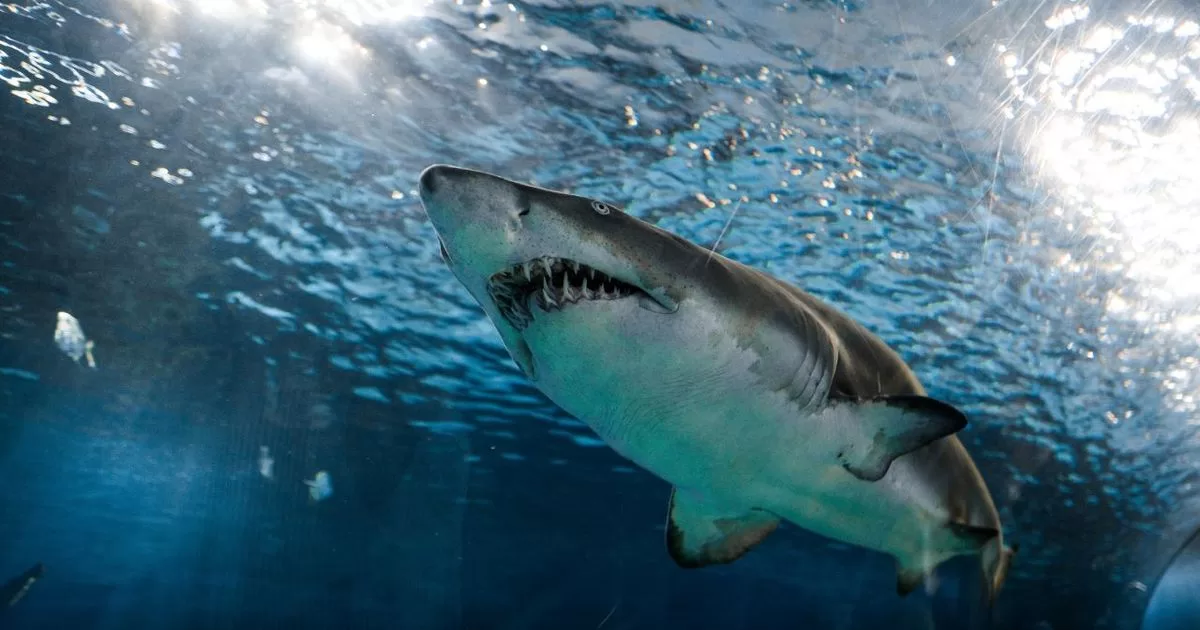MIAMI.- Florida It is famous for its warm climate, beautiful beaches and white sands. But it also continues to be the state with the record of shark attacks highest annual consumption in the world, according to the University of Florida International Shark Attack File (ISAF).
According to the report, published by the Florida Museum of Natural History,16 people in the Sunshine State were attacked by sharks in unprovoked events, which the authors define as any case in which a shark is in its natural habitat and attacks without any human provocation.
Of the 16 attacks, 8 occurred in Volusia County, 2 in Brevard, 2 in St. Lucie and one in Miami-Dade, Palm Beach and two counties near the Gulf of Mexico, none of which ended in fatalities.
These figures represent 44% of the country’s total and 23% of bites worldwide, and are in turn lower than the annual average of the most recent five years in Florida, which is 19 incidents.
Most of the attacks were reported at a beach in Volusia County, which has been recognized as the shark bite capital of the world. Surfers and other aquatic athletes were the ones who suffered the greatest number of attacks.
New Smyrna Beach, located in Volusia County, was rated the most dangerous beach in the country in a Travel Lens study, due to its frequent shark attacks.
Alarming figures in the world
Worldwide, there were 69 unprovoked events involving sharks in 2023, mostly in Australia and the United States. Which exceed the 63 people attacked by this fish the previous year, according to the investigation.
The US once again topped the list of countries where shark attacks occur the most. In total, 36 unprovoked attacks were recorded in 2023, representing 52% of incidents worldwide. Among them, two were fatal, one in California and another in Hawaii.
Other bites were confirmed on the coast of Costa Rica, Colombia, Brazil, New Zealand, Seychelles Islands, Turks and Caicos Islands, Ecuador, the Galapagos Islands, and South Africa.
Likewise, the researchers highlighted that last year deaths caused by sharks doubled, with an alarming number of 10 people, compared to the previous year when there were 5 deaths due to this cause, becoming the highest number in the last 12 years.
Of those 10 fatalities worldwide during 2023, Australia recorded four deaths, which represented 22% of all attacks and 40% of deaths.
Three of these deaths occurred off the coast of southern Australia, in a region called Eyre Peninsula, where a recovering seal population motivated white sharks to approach a remote region frequented by surfers.
Other deaths from shark attacks occurred in the Bahamas, Egypt, Mexico and New Caledonia, the researchers said.
The records also include 22 additional attacks in 2023 that were intentionally or unintentionally provoked, with the most common activity among victims being spearfishing.
“This is within the range of the normal number of bites, although the deaths are a little disconcerting this year,” said Gavin Naylor, director of the shark research program at the Florida Museum of Natural History.
More people in the oceans
Experts noted that the number of white shark attacks has increased in recent decades. However, this is not due to increased aggression by this species but rather due to the presence of more people in the ocean each year and a greater emphasis on reporting bites and deaths.
“Each year, there are fewer than 100 unprovoked bites, making it more likely for someone to win the lottery than to be attacked by a shark. When there are more attacks, it often means that more people are spending time in the water, not that sharks have become more dangerous,” they emphasized.
They named three species responsible for most of the attacks, including the great white shark, the tiger shark and the bull shark. However, they assured that “any large shark, approximately two meters, is a potential threat to humans.”
Finally, although the chances of being bitten by a shark are incredibly low, they offered a series of recommendations, such as always staying close to the coast, not swimming at dawn or dusk, and avoiding excessive splashing.
@Lydr05
Source: With information from the University of Florida International Shark Attack File (ISAF)






